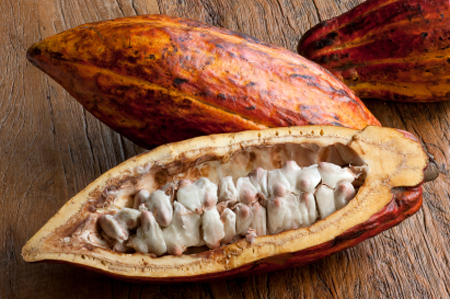Cocoa Farms Crave Rain as West African Winds Blast Bean Pods
Category: Cocoa
 (Bloomberg) – At his 300-acre cocoa plantation in southwestern Ghana, Johnson Mensah spent January watching his livelihood shrivel on the trees.
(Bloomberg) – At his 300-acre cocoa plantation in southwestern Ghana, Johnson Mensah spent January watching his livelihood shrivel on the trees.
Dry, dusty winds coming from the Sahara desert lasted twice as long as last year in parts of West Africa, destroying pods on cocoa trees. Ghana, the second-biggest grower, faces the worst harvest in five years and bigger rival Ivory Coast will collect about 20 percent less from April to September than a year ago, according to government estimates and Marex Spectron Group.
“There are no pods on the trees,” 61-year-old Mensah said by phone last week from Enchi, a town that’s a six-hour drive from Accra, the capital of Ghana. “We hope to get more rainfall, so that pods can develop on the trees and bear some fruits.”
The drop in supply may not boost prices much because demand from chocolate makers is weakening, said Jonathan Parkman, the co-head of agriculture at Marex Spectron in London. Production should match demand this season, the International Cocoa Organization says. The impact locally may be more substantial because more than half of workers in Ivory Coast and Ghana are employed in agriculture, according to the CIA World Factbook.
The Harmattan, as the seasonal winds are called, dried out cocoa pods and stripped trees of leaves and many of the flowers that turn into pods. The winds swept over Abidjan, Ivory Coast’s biggest city, for 14 days in January, compared with no more than five last year, according to Antoine Koffi Kouassi, an independent meteorologist in Abidjan.
No Rain
In Daloa, a town in Haut-Sassandra, one of Ivory Coast’s biggest-growing regions, it didn’t rain from Dec. 21 through Jan. 31, data from the National Meteorological Service show.
The dry weather is adding stress to Ivorian trees already weakened from last season’s record harvest. Farmers may reap about 400,000 metric tons in the six months beginning in April, 20 percent less than last year, Marex’s Parkman said by phone on Feb. 3.
The total harvest will be at least 1.63 million tons, Parkman said, which would be a 6.3 percent drop from last year. The country’s season includes an October to March main harvest.
In Ghana, production will drop to 820,000 tons, a person familiar with the government’s forecast said last month, asking not to be identified because the information hasn’t been made public. That would be a 9 percent decline from the previous season. Farmers collect a main harvest from October through May, followed by a smaller one from July through September.
‘Not Spectacular’
More rain is coming, according to MDA Weather Services in Gaithersburg, Maryland. The meteorological company predicts Ghana will get rain closer to normal later this month and levels in the Ivory Coast will be slightly below average.
“We could be in for a reasonable, not spectacular crop,” Edward George, the London-based head of research for Ecobank Group, said by phone Jan. 28. “The trees simply cannot produce a crop as strong as last year.”
The biggest driver for cocoa prices right now is weakening demand for beans from chocolate manufacturers, Marex’s Parkman said. Cocoa processing fell in Asia, Europe and North America in the fourth quarter, industry reports showed last month.
“I’m probably a little bit bearish,” Parkman said. “The bull story was predicated on the fact that demand would remain relatively robust.”
Futures tumbled 18 percent from a three-year high in September, to $2,778 a ton as of 10:02 a.m. in London.
Even against a backdrop of lackluster demand and lower prices, rain can’t come soon enough for West Africa’s farmers.
“We’re reassured by the end of the Harmattan,” said Jean Gervais Kadio, who farms 5 hectares (12 acres) in the southeastern village of Yakasse, Ivory Coast. “It was starting to be long and worrying. The little rain we’ve had will enable the cocoa trees to get some water, even if it’s not enough.”

